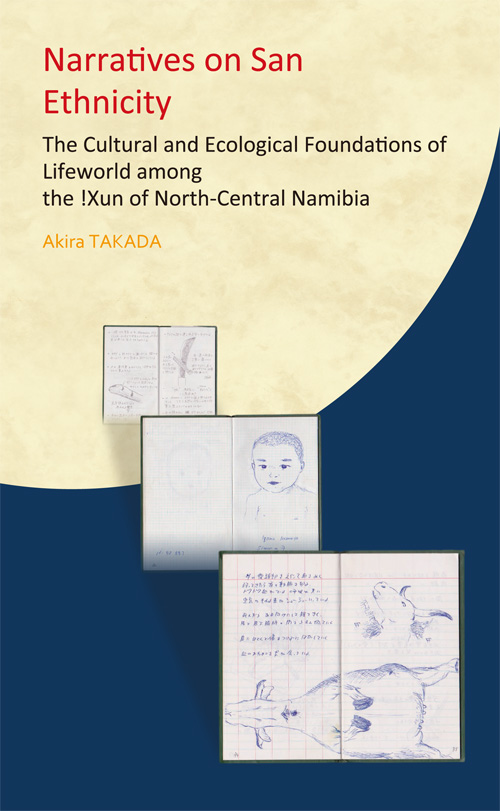Home > Book Detail Page

The cultural and ecological foundations of ethnicity of the !Xun, a group of the San, provide a case study in this book for an intensive regional structural comparison of Ju societies. Long known to Western Europe as the ‘Bushmen’, the San consist of various groups distinguished by language, locale, and practice. This book focuses on the !Xun, who have lived in north-central Namibia for centuries, and adopts a life story approach to understand the lived histories of the people. It looks at interethnic relationships and the multidimensional associations with neighboring groups, particularly the Owambo and ǂAkhoe, Akira Takada scrutinizes kinship and naming terminologies, transitions of ethnicity, the interplay between ethnicity and familial/kin relationships, and the reorganization of environmental features that effect child socialization. This book provides a valuable research perspective in San studies and in the emerging anthropology of their life-world, and is a significant addition to the small body of anthropological studies on the !Xun.
Akira TAKADA is Associate Professor in the Graduate School of Asian and African Area Studies at Kyoto University, Japan. He received a master's degree from Kyoto University (1996) in Psychology and a PhD from Kyoto University (2003) in Human and Environmental Studies. His academic interests include language socialization, environmental perception, and ethnicity formation. He has conducted intensive field research in Namibia, Botswana, Japan, and the United States. He has published a number of articles, including ‘ Pre-verbal infant-caregiver interaction' in A. Duranti, E. Ochs, and B. B. Schieffelin (eds.), The handbook of language socialization (Blackwell, 2012); 'Recapturing space: Production of inter-subjectivity among the Central Kalahari San' in Journeys: The International Journal of Travel and Travel Writing, 9 (2): 114-37 (Berghahn Journals, 2008); and ‘Language contact and social change in north-central Namibia: Socialization via singing and dancing activities among the !Xun San' in O. Hieda, C. König, and H. Nakagawa (eds.), Geographical typology and linguistic areas: With special reference to Africa (John Benjamins, 2011).
Figures
Plates
Tables
Preface
Author's Biography
Notes on orthography
1. Introduction
Talking about the San
The San of north-central Namibia
The Ekoka !Xun
2. Kinship and Naming Terminology among the !Xun
Studies on kinship and naming among the Ju|'hoan
Kinship terms of the !Xun
Naming practices of the !Xun in relation to their kinship terms
Conclusion
3. Inter-recognition of Marginalization: The Historical Transition of !Xun Ethnicity
Analysis of the 1ife stories
Changes of !Xun ethnicity in north-central Namibia
Conclusion
4. Narratives of Life Changes: Surname and Interethnic Relationships among the !Xun
Studies on San family/kinship
!Xun family/kin relationships and ethnicity
Conclusion
5. Post-foraging Society and Child Socialization
Foraging society and children
Changing socioeconomic environments for child socialization of the !Xun
Conclusion
6. Conc1usion
Coping with ‘others'
An ethnicity dock
Cultural diversity, complexity, and resilience
Notes
Bibliography
Index
Plates
Tables
Preface
Author's Biography
Notes on orthography
1. Introduction
Talking about the San
The San of north-central Namibia
The Ekoka !Xun
2. Kinship and Naming Terminology among the !Xun
Studies on kinship and naming among the Ju|'hoan
Kinship terms of the !Xun
Naming practices of the !Xun in relation to their kinship terms
Conclusion
3. Inter-recognition of Marginalization: The Historical Transition of !Xun Ethnicity
Analysis of the 1ife stories
Changes of !Xun ethnicity in north-central Namibia
Conclusion
4. Narratives of Life Changes: Surname and Interethnic Relationships among the !Xun
Studies on San family/kinship
!Xun family/kin relationships and ethnicity
Conclusion
5. Post-foraging Society and Child Socialization
Foraging society and children
Changing socioeconomic environments for child socialization of the !Xun
Conclusion
6. Conc1usion
Coping with ‘others'
An ethnicity dock
Cultural diversity, complexity, and resilience
Notes
Bibliography
Index











